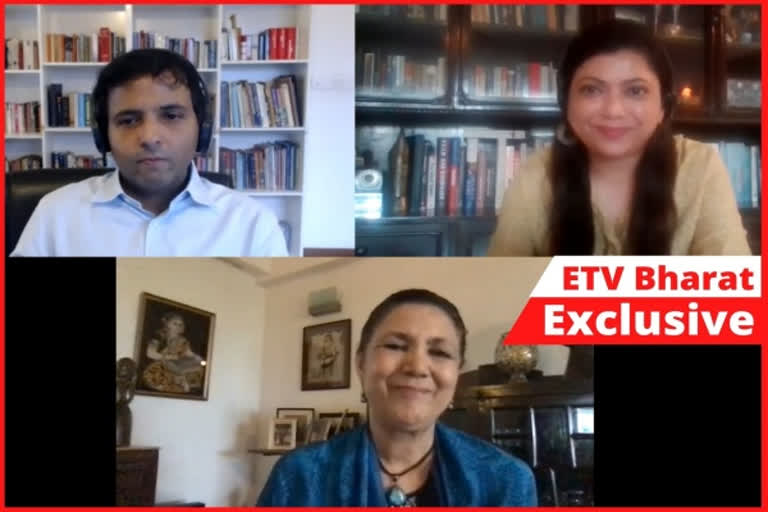Hyderabad: The first of its kind virtual Democratic National Convention held last week officially saw Joe Biden and Kamala Harris being declared as the Presidential and Vice Presidential candidates by the opposition Democrats in the upcoming November American polls.
As the first Black woman, first Indo-American and Asian-American immigrant nominated by a major party for the Vice Presidential race, what does Kamala Harris’s choice as Biden’s running mate mean for Americans and India?
Senior Journalist Smita Sharma in a first of a series of conversations focusing on various aspects of ‘Battleground USA 2020’ spoke to Meera Shankar, the former Indian Ambassador to America and Sriram Lakshman, the US Correspondent for The Hindu based in Washington DC.
Sriram Lakshman spoke of why Harris is being seen as a good pick by Presidential candidate Joe Biden who himself had served as Vice President during Barack Obama’s term.
“She (Kamala Harris) has a very strong public service background. She has decades of work in California as a public prosecutor. She was herself the presidential candidate. Also, she has a multi-racial background. She appeals to Black voters, South Asian voters, she is a woman. It is not necessary that for that reason these demographics will certainly vote for her. But she is a very good pick for Biden to really widen his reach in that sense. She is also a couple of decades younger than Joe Biden. The pair of them together represent the future for the next at least four or eight years and beyond,” said Sriram Lakshman.
“Race is one factor because of the Black Lives Matter movement and the fact that America is embroiled in racial turmoil at the moment. So it is a very topical issue. But going beyond that it is also a question of values and policies,” remarked Meera Shankar.
Asked about why the Indian-American community is being wooed by both Republicans and Democrats actively, despite the numbers not being really large, the retired diplomat underlined that the community has a very active political and economic profile today.
Also read: Biden picks Kamala Harris as running mate, first black woman
“It is not such a large vote bank. Asians all together are around 4.7 percent of the total electorate, Hispanics would be the largest minority at 13 percent and Blacks a Little over 12 percent . So in terms of numbers, it is not so important. But the swing states are going to be very important in these elections where every vote is going to count. In some of the swing states Indian-American community could be insufficient concentration to swing the vote one way or the other,” said Meera Shankar.
“The community is a wealthy community and they want to be more active in politics. So they have been taking a more active interest as political donors in recent years. And everybody-both Democrats and Republicans are trying to raise as much money as they can for what promises to be a toughly contested election. So for all these reasons the Indian-American community is being wooed by all sides. Also in the economic life of America, the India-Americans now head some of their most iconic companies. Whether it is Google. Microsoft, IBM, Mastercard. Earlier it was also Pepsico. These are not just small or middle-sized companies. These are the real biggies of America,” the former envoy added.
Underlining that both parties are trying to get at least a million of the 1.3 million community votes in some 7 swing states, Sriram Lakshman remarked, “Based on the numbers that we have, overwhelmingly Indian Americans traditionally vote Democrats. About 77 percent voted for Hillary Clinton. The difference between Trump and Hillary Clinton in 2016 was less than the number of Indian Americans who live in some of these swing states. And so overall both parties are making a play.”
Sriram also underlined that the Indo-American community votes differently depending on the age profiles and the older generations may still want to go with Trump despite the Indian heritage of Kamala Harris.
“The way older Indian Americans vote, who were perhaps born in India, is not the same as the younger generations and 45-year-olds. They tend to vote like the other Americans,” he said. “Some people will be pulled to trump because of the Modi-Trump equation. But as you go to the younger Indian Americans they will vote for jobs, how do you recover from the pandemic. The racial issues,” he added.
Also read: Harris seizes historic moment in accepting VP nomination
The discussion also focused on Kamala Harris’s uncomfortable relations with New Delhi on contentious issues like Kashmir, CAA and NRC, and the subject of human rights and liberal values that Democrats bat for more strongly, how will it play out vis a vis a majoritarian government under popular Prime Minister Modi in India.
“There are pros and cons. Overall there is a bipartisan consensus to build a relationship with India. This is driven by a growing strategic convergence about how to manage the challenge of China. And its increasingly assertive if not actually bullying behaviour in Asia. That is the unique cement that brings the two countries together and that straddles both parties. It is not specific to either Democrats or Republicans,” said Meera Shankar.
She added that Democrats have always given more prominence to human rights but ‘it is never to the exclusion of the core interests’ with other countries and these are issues that India too has learnt to navigate through.
However she added that India must prioritise its bread and butter issues and some of the Trump administration’s decisions like withdrawal of GSP and Least Developing Country status to India, increase in tariff of steel and aluminium imports, and suspension of H1B visas till this year-end at least has hit Indian competitiveness and business in the stomach, regardless of more favourable statements by Trump on political matters that are sensitive for New Delhi.



